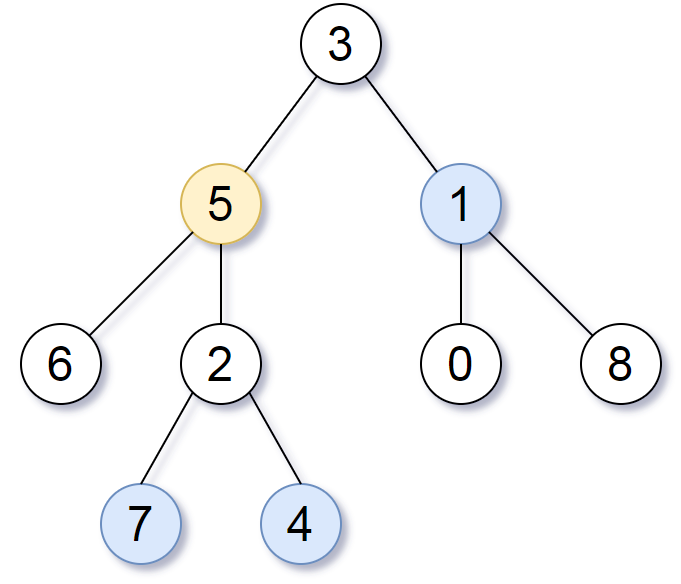Problem
Given the root of a binary tree, the value of a target node target, and an integer k, return **an array of the values of all nodes that have a distance *k* from the target node.**
You can return the answer in any order.
Example 1:

Input: root = [3,5,1,6,2,0,8,null,null,7,4], target = 5, k = 2
Output: [7,4,1]
Explanation: The nodes that are a distance 2 from the target node (with value 5) have values 7, 4, and 1.
Example 2:
Input: root = [1], target = 1, k = 3
Output: []
Constraints:
The number of nodes in the tree is in the range
[1, 500].0 <= Node.val <= 500All the values
Node.valare unique.targetis the value of one of the nodes in the tree.0 <= k <= 1000
Solution (Java)
/**
* Definition for a binary tree node.
* public class TreeNode {
* int val;
* TreeNode left;
* TreeNode right;
* TreeNode(int x) { val = x; }
* }
*/
class Solution {
private void kFar(TreeNode root, int k, TreeNode visited, List<Integer> ls) {
if (root == null || k < 0 || root == visited) {
return;
}
if (k == 0) {
ls.add(root.val);
return;
}
kFar(root.left, k - 1, visited, ls);
kFar(root.right, k - 1, visited, ls);
}
public List<Integer> distanceK(TreeNode root, TreeNode target, int k) {
List<Integer> ls = new ArrayList<>();
if (k == 0) {
ls.add(target.val);
return ls;
}
nodeToRoot(root, target, k, ls);
return ls;
}
private int nodeToRoot(TreeNode root, TreeNode target, int k, List<Integer> ls) {
if (root == null) {
return -1;
}
if (root.val == target.val) {
kFar(root, k, null, ls);
return 1;
}
int ld = nodeToRoot(root.left, target, k, ls);
if (ld != -1) {
kFar(root, k - ld, root.left, ls);
return ld + 1;
}
int rd = nodeToRoot(root.right, target, k, ls);
if (rd != -1) {
kFar(root, k - rd, root.right, ls);
return rd + 1;
}
return -1;
}
}
Explain:
nope.
Complexity:
- Time complexity : O(n).
- Space complexity : O(n).